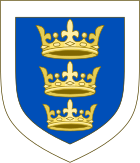| Act of Parliament | |
 | |
| Long title | An Act confirming all the Statutes made in England. |
|---|---|
| Citation | 10 Hen. 7. c. 22 (I) (The Irish Statutes numbering) 10 Hen.7 c.39 (Analecta Hibernica numbering) |
| Introduced by | Probably Sir Edward Poynings, Lord Deputy of Ireland |
| Territorial extent | Ireland |
| Dates | |
| Commencement | 1 December 1494 |
| Repealed | 8 May 2007 (Republic of Ireland) |
| Other legislation | |
| Repealed by | Statute Law Revision Act 2007 (Republic of Ireland) |
| Status | |
| Republic of Ireland | Repealed |
| Northern Ireland | Still in force |
| Text of statute as originally enacted | |
| Text of the Poynings' Law 1495 as in force today (including any amendments) within the United Kingdom, from legislation.gov.uk. | |
An Act confirming all the Statutes made in England (10 Hen. 7. c. 22 (I); short title Poynings' Law in Northern Ireland[1] and Poynings' Act 1495 in the Republic of Ireland[2]) is an act passed by the Parliament of Ireland which gave all statutes "late made" by the Parliament of England the force of law in the Lordship of Ireland. It was passed by Poynings' Parliament, along with other acts strengthening English law in Ireland, one of which was commonly called "Poynings' Law" until its virtual repeal by the Constitution of 1782.
Many of the English acts adopted by Poynings' Law were repealed with respect to Ireland by the Statute Law Revision (Ireland) Act 1872, having already been repealed with respect to England by the Statute Law Revision Act 1863 and others. Poynings' Law itself remains in force in Northern Ireland.[3] In the republic, it was repealed by the Statute Law Revision Act 2007, without thereby repealing the English statutes it referred to, a few of which remain in force.[4]
Cite error: There are <ref group=lower-alpha> tags or {{efn}} templates on this page, but the references will not show without a {{reflist|group=lower-alpha}} template or {{notelist}} template (see the help page).
- ^ Short Titles Act (Northern Ireland) 1951
- ^ Short Titles Act 1962
- ^ Text of the Poynings' Law 1495 (c.22) as in force today (including any amendments) within the United Kingdom, from legislation.gov.uk.
- ^ "Seanad debates". 1 May 2007. p. 7.